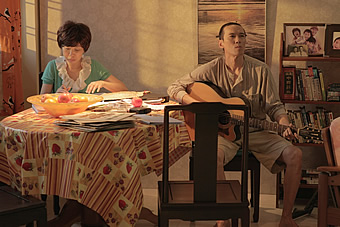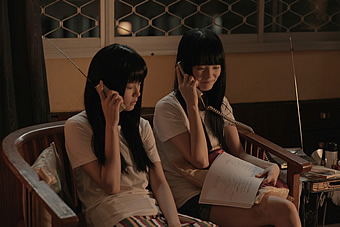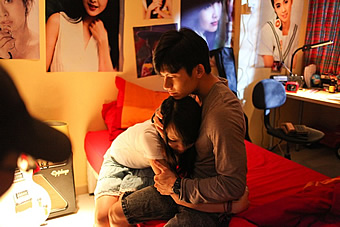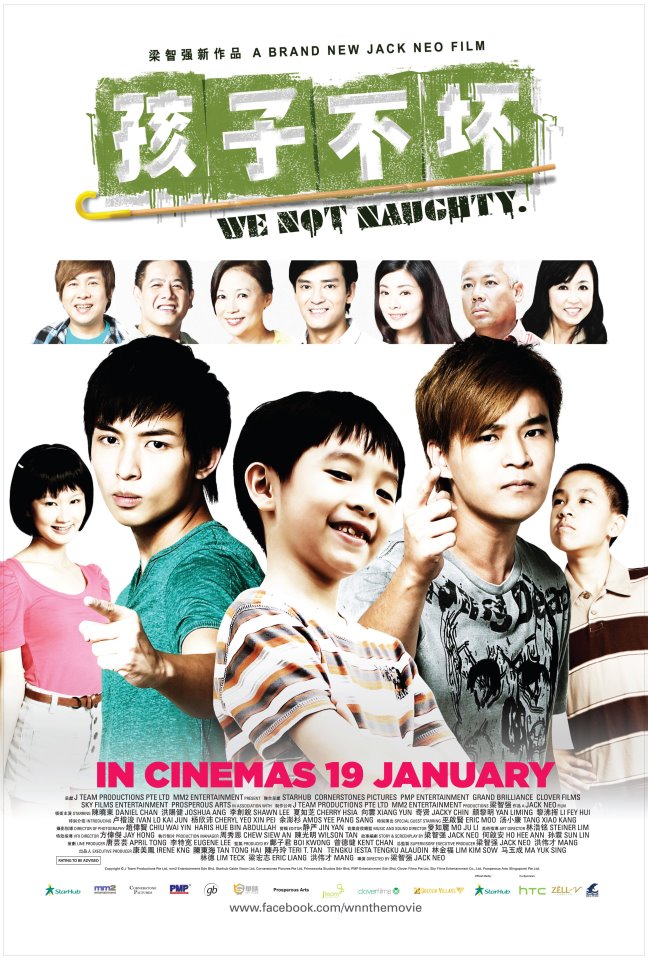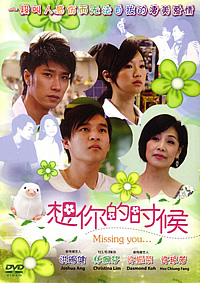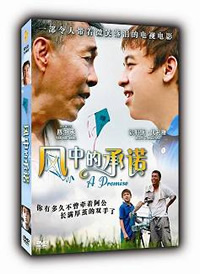THAT GIRL IN PINAFORE (我的朋友,我的同学,我爱过的一切) (2013)
Genre: Drama/Comedy
Director: Chai Yee-wei
Cast: Julie Tan, Daren Tan, Seah Jiaqing, Kenny Khoo, Jayley Woo, Hayley Woo, Kelvin Mun, Sherly Ng
RunTime: 1 hr 50 mins
Rating: PG13 (Some Sexual References)
Released By: GV
Official Website: www.thatgirlinpinafore.com
Opening Day: 1 August 2013
Synopsis: Should you follow your heart or your head? That Girl in Pinafore is a coming-of-age tale set in 1993, Singapore, about dreams, friendships, and first loves.
The story follows four teenagers' efforts to bring business back to a struggling folk music pub, and the blossoming love between Jiaming and May, both fans of Singaporean folk music. 1992 – Singapore is on the verge of electing its first President, and chewing gum has been banned. Hope and rejuvenation is in the air, everyone believes in the Singapore Dream. Young musicians strive to give birth to a local music industry, creating local music at a rapid pace. Music cafes spring up everywhere alongside the hot new trend, karaoke. Jiaming is a free spirited teenager who has never taken school seriously. His parents own a music pub called ‘Meng Chuan’, and Jiaming feels schooling is useless as he wants to help out at the business.
True enough, Jiaming flunks his ‘O’ level exams and drops out of school. Jiaming’s buddies Caogen, Haoban and Xiaopang pass their exams and move on to Junior College. But they are caught renting porn magazines by the principal and are suspended for a month. During this month, the boys take part in a local music competition, have a taste of first love, and work hard to bring business back to the struggling ‘Meng Chuan’.
This coming-of-age tale sees Jiaming and gang learn the harsh realities of pursuing dreams in the real world. In growing up, the boys learn that choosing between your heart and societal expectations is akin to losing your innocence to the adult world. The eventual closure of the pub ‘Meng Chuan’ paralells the real world demise of the ‘Xinyao’ movement around the mid-90s. It signifies the lost of youthful innocence to the necessities of growing up.
Movie Review:
Chances are, if you were a male student who had spent your teenage years in Singapore’s education system, you’d have at some point had a crush on a girl in a pinafore. But more than just a heartfelt ode to that formative experience, Chai Yee-Wei’s sublimely beautiful ‘That Girl in Pinafore’ also portrays the heady feelings of teenage love that whether male or female will surely be able to identify with. Yes, those tentative words, that sweet first kiss, the nights talking secretly on the phone, and then perhaps for quite the majority the eventual heart-breaking parting, all that is lovingly captured in one of the most affecting local films we have seen.
Comparisons with Taiwan’s own smash hit ‘You’re the Apple of My Eye’ are inevitable, but to dismiss this movie as a slavish copy of the other is a gross injustice. After all, even before last year, such chronicles of the growing pains and puppy loves of local teenagers were already captured on film thanks to ‘The Teenage Textbook Movie’. Chai’s film is however also much more than just an update of that earlier movie for a different generation; rather it also pays tribute to an era of local music that has sadly gone out of fashion - and we’re referring here to the ‘xinyao’ movement, which saw its heydays in the 1990s with well-known household names such as Liang Wern Fook and Billy Koh.
It’s an absolutely winsome combination - that of teenage romance and ‘xinyao’ - with one complimenting the other in significance and ultimately poignancy. The most heartfelt type of romances have somehow always found their expression in song, and Chai - who co-writes the script with Violet Lai - has crafted a tender love story to give new meaning to the ‘xinyao’ tunes of yesteryears - including ‘细水长流’, ‘黎明的心’ and ‘麻雀衔竹枝’. No less than Liang has contributed to their new arrangements, and whether amping some to rock-n-roll or simplifying others to just guitar, the songs perfectly mirror the mood of the film at different points no matter in rapture, wistfulness or sorrow.
That in a nutshell describes the narrative arc of the film, which begins in cheerful insouciance as lead protagonist Jia Ming (Project Superstar winner Daren Tan) and his group of three closely knit friends - Hao Ban (Kenny Khoo), Cao Gen (Seah Jia Qing) and Xiao Pang (Kelvin Mun) - make acquaintance with May (Julie Tan) and her two friends Jayley and Hayley (Jayley and Hayley Woo respectively). Jia Ming is enamoured with Julie from the start, but Hao Ban and Cao Gen only start cosying up to Jayley and Hayley after the three girls agree to help Jia Ming and his friends revive the former’s struggling music café business.
The fairly standard boy-meets-girl routine gets a surprisingly earnest treatment by being rooted in a strong sense of time and place. The year is 1993, the heydays of the ‘xinyao’ revolution, where cafes like Jia Ming’s parents’ ‘Dream Boat’ were a dime a-dozen and ‘xinyao’ competitions were the rage. And yet a good education was still first and foremost in the minds of most parents, be it Hao Ban’s working-class ‘cha kway teow’ stall parents, or May’s well-to-do single mother, with lines being drawn by arrogant kids like James between the ones in JC and the ones who could not make it.
The latter is also the reason why Jia Ming isn’t in the same school as his other three friends, and spends his days instead helping out with the family business. Yes, the hard truth is that academics matter very much where you end up in life, and the film finds deep relevance in its setting and context by portraying keenly the attitudes, norms and fads of a distinctly 90s cultural and social environment. Chai has obviously drawn from his own experiences growing up in such that era, which we guarantee will certainly resonate strongly with anyone who’s been through the Singaporean education system and even more with those who have spent the early part of the 90s in that system.
Through music and lyrics, Jia Ming and May’s mutual attraction takes shape. Ditto for their attempt to revive ‘Dream Boat’ - well, at least at the start. On the first night of the boys’ makeover from ‘bo chap’ open mic singers to chic rock-star wannabes, May succumbs to the condition of her weak heart and is rushed to hospital, precipitating a meeting of two worlds - one, her social world where Jia Ming and his group of friends belong; and two, her home background where her single mother is trying too hard to secure the future she wants for May and removing any obstacles (including the wrong company) along the way.
At the halfway mark, what began as an upbeat celebration of the carefreeness of youth takes a decidedly melodramatic turn, and here is where we suspect some will criticise it for being heavy-handed. To be sure, Chai does succumb to the overdramatic as May’s mother takes draconian steps (including locking her inside her room) to thwart her relationship with Jia Ming - yet in parts where restraint might have served it better, the sincere performances from Daren and Julie keep the movie afloat, as well as their audience emotionally invested in a happily-ever-after.
Alas only the idealistic are likely to hold on to that hope as the beat gets more melancholic and the mood more circumspect; but Chai ultimately brings a beautifully bittersweet closure to the proceedings with an arch coda set 18 years later in present time. The reason for such a time jump isn’t immediately clear, but when revealed, is surprisingly elegant and meaningful, conveying an evocative point about how teenage memories are never quite forgotten even if don’t always surface in our everyday consciousness. What’s also clear is how this must have been a personal tale for Chai, the feelings of wistfulness quite likely his very own looking back at his teenage years, a similar sentiment that he knows many young and middle-aged adults share.
And so even though its teenage coming-of-age romance isn’t anything new, the fact that it is so rooted in a uniquely Singaporean context makes it all the more special and moving. Chai captures the details of the Singaporean teenager so attentively, evoking memories and feelings we are sure many will be able to identify with or reminisce about. Of course, the fact that it boasts some lovely ‘xinyao’ tunes only makes the whole experience all the sweeter and touching. Yes, we admit we are very much biased here, but there is something indescribably charming and delightful about the chord it struck in our hearts - and we dare say this will be our favourite local film this year.
Movie Rating:




(Brimming with cheerful insouciance, heartfelt poignancy and bittersweet wistfulness, this uniquely Singaporean coming-of-age tale is both a beautiful tribute to the teenage experience and a lovely ode to the ‘xinyao’ movement)
Review by Gabriel Chong
You might also like:
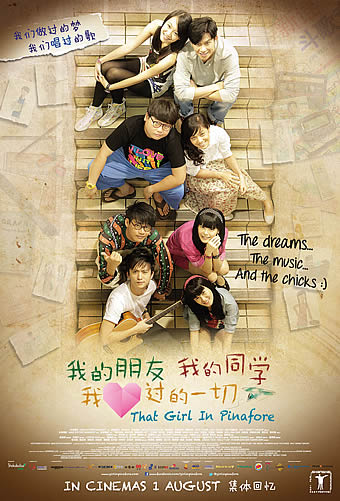
Movie Stills
